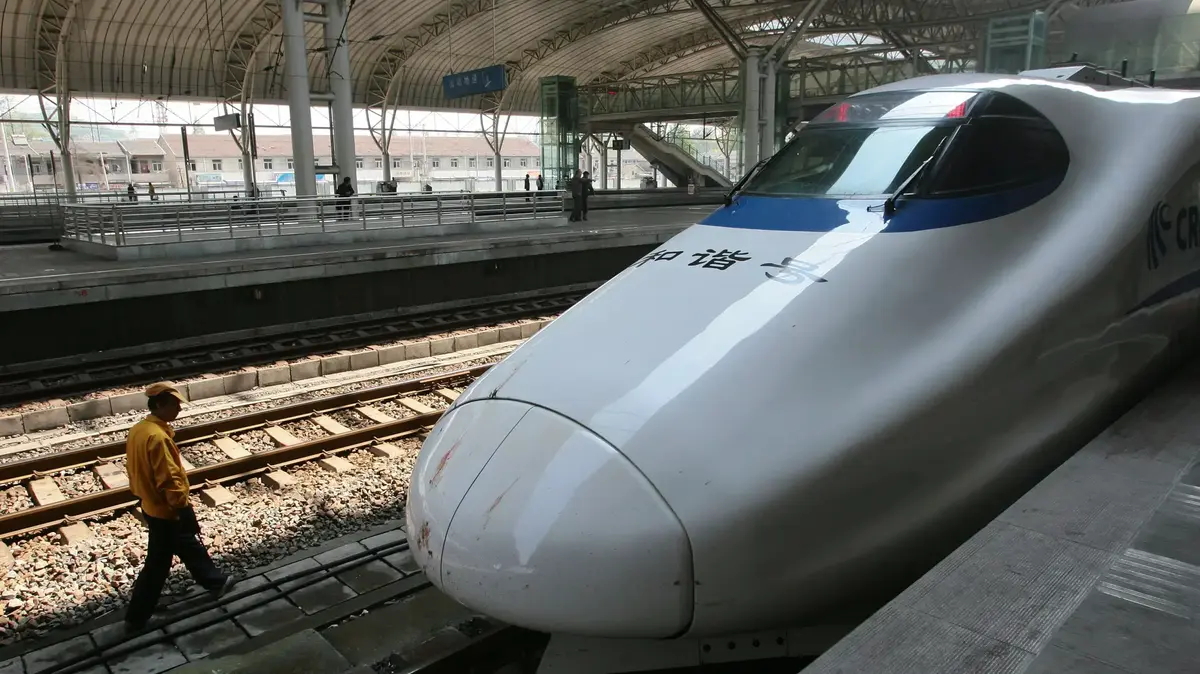High speed train in China.
Before the regular trains arrive on time (Photo: GettyImages)
One of the plans put forward by the Likud in the coalition negotiations is to build "bullet trains", super fast and expensive trains, between the major metropolises. Israel Railways already has such a plan as part of the development projects for 2040, but the data of the Central Bureau of Statistics reveal that Israelis have more urgent demands from transportation The
processing of the CBS data based on a survey with the participation of 7,500 people, carried out by the Public Transportation Authority at the Ministry of Transportation, reveals that the respondents indicated the speed of travel on public transport only as the third most important improvement. In second place was ranked an accurate timetable, that is, an improvement in the ability of passengers to safely Because the bus or the train will really arrive at the station and on time. In first place were ranked stations close to the residences, an ability that bullet trains, which require a limited number of stations to operate efficiently, have difficulty providing. On the other hand, the metro network can offer such an ability to many Israelis, and it is also one that the Likud has stated it will promote in the new government.
Decrease in the use of public transportation
For the first time since 2016, there is a decrease in the use of a private car as a means of getting to work, albeit a slight one.
But after four consecutive years of increase, from 58.6% six years ago to 63% in 2020, the usage rate dropped in 2021 to 61.4%.
On the other hand, there was a more significant decrease in the use of public transportation.
If in 2016 the proportion of commuters to work by public transportation reached 20.3%, in 2020 it has already reached 15.4%, and in 2021 to 15.2%. This is not only the effects of the corona virus, but a trend that broke out long before the pandemic. Despite this Precisely in the two major metropolises, Jerusalem and Tel Aviv, there was a slight increase in the use of public transportation in the last year, where in the capital (25%) the rate is significantly higher than in Tel Aviv (19.1%).
Perhaps thanks to the fact that a light rail has been operating in Jerusalem since 2011, in Tel Aviv it is currently scheduled to start operating only in 2023, when the Jerusalem Railway will receive two significant extensions that will increase the number of passengers.
Despite this, the rate of satisfaction among Jerusalemites with public relations is lower than in the other major cities, but jumped between 2020 and 2021 from 52.8% to 57.2%. In Tel Aviv, a decrease was recorded from 71.5% to 68.4%. An increase in satisfaction was also recorded in Be'er Sheva (from 70.1% to 70.4%) and a decrease was also recorded in Haifa (from 77.8% to 71.4%).
More women (19.2% compared to 12%) travel to work by public transportation and more men (66.7% compared to 57.7%) arrive In a private car. More men ride bicycles and scooters (3% vs. 1%), or arrive by organized transportation (8% vs. 4.3%). More women walk (9.9% vs. 4.5%) or work from home (7.8% vs. 5.8%).
The use of a private car jumps from the age of 34, probably after becoming financially established, or moving to a settlement further from work.
While the proportion of those reporting to work by bicycle and scooter has risen and fallen slightly in the last six years, but the bottom line was 9% in 2016 and 2021.
On the other hand, there is an increase in the proportion of workers from home: from 12.1% six years ago to 12.7% in 2020 and 14.4% in 2021.
Increase in satisfaction with public relations in Jerusalem and Be'er Sheva, decrease in Tel Aviv and Haifa (Photo: Flash 90, Yossi Zamir, Flash 90)
An increase in the number of families with 2 and 3 cars
Although we travel more to work than by private vehicle, we own more cars, for trips for recreation and leisure, and on weekends when there is no public transport alternative.
The proportion of households that do not own a car at all reached 21.4% last year, an increase compared to 2020 (20.6 %) but a decrease compared to 2016 (24.4%).
At the same time, there was a slight decrease in the number of households owning one car, from 45.4% to 44.1%, but an increase in the number owning two cars, from 26% to 27.8%, and those owning three Cars, from 4.2% six years ago to 6.7% a year ago, a 60% increase in five years.
More in Walla!
How effective is the flu vaccine in preventing the disease?
Here is all the data
Public service on behalf of AstraZeneca
A 60% jump in the number of families with 3 cars.
This is what it's like when you don't trust the Public Security Agency (Photo: ShutterStock)
vehicle
car news
Tags
Public Transport
vehicle
a train

